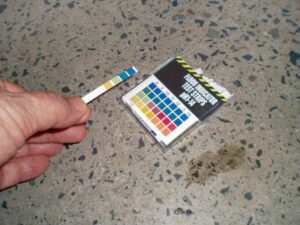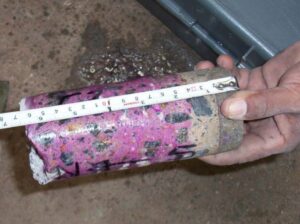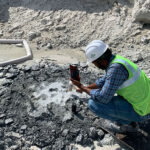- April 29, 2025
A carbonation test is a method used in civil engineering and construction to determine the depth of carbonation in concrete. Carbonation is a chemical reaction between carbon dioxide (CO₂) in the air and calcium hydroxide (Ca(OH)₂) in the concrete, which can reduce the pH of the concrete and lead to corrosion of reinforcement (steel rebars).
The pH test is a method used to determine the alkalinity of concrete, which is a key indicator of its ability to protect embedded steel reinforcement. When the pH falls below a critical level (usually ~9), the protective passive layer around steel can break down, leading to corrosion.
While the pH test requires extracting a small concrete sample, it is often grouped under semi-destructive NDT because the process does not compromise structural integrity and is essential for durability assessment.












